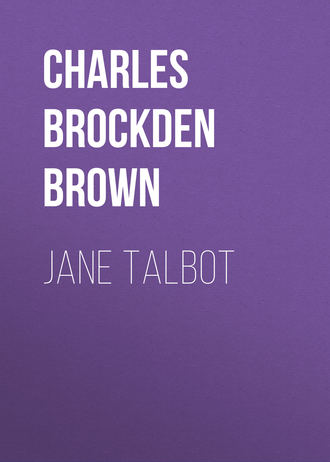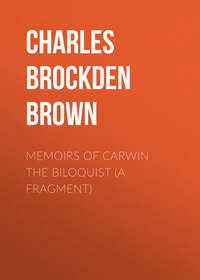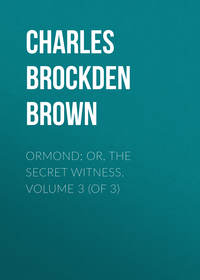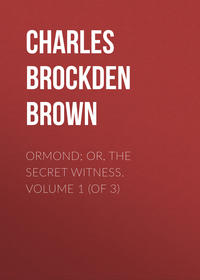 полная версия
полная версияJane Talbot
Happily, at this time, just such a cheap and humble, but neat, new, and airy dwelling as my friend required, belonging to Mrs. Fielder, was vacant. You know the house. 'Tis that where the Frenchman Catineau lived. Is it not a charming abode?–at a distance from noise, with a green field opposite and a garden behind; of two stories; a couple of good rooms on each floor; with unspoiled water, and a kitchen, below the ground indeed, but light, wholesome, and warm.
Most fortunately, too, that incorrigible Creole had deserted it. He was scared away by the fever, and no other had put in a claim. I made haste to write to my mother, who, though angry with me on my own account, could not reject my application in favour of my good widow.
I even prevailed on her to set the rent forty dollars lower than she might have gotten from another, and to give a lease of it at that rate for five years. You can't imagine my satisfaction in completing this affair, and in seeing my good woman quietly settled in her new abode, with her daughter Sally and her servant Alice, who had come with her from Europe, and had lived with her the dear knows how long.
Mrs. Henning is no common woman, I assure you. Her temper is the sweetest in the world. Not cultivated or enlightened is her understanding, but naturally correct. Her life has always been spent under her own roof; and never saw I a scene of more quiet and order than her little homestead exhibits. Though humbly born, and perhaps meanly brought up, her parlour and chamber add to the purest cleanliness somewhat that approaches to elegance.
The mistress and the maid are nearly of the same age, and, though equally innocent and good-humoured, the former has more sedateness and reserve than the latter. She is devout in her way, which is Methodism, and acquires from this source nothing but new motives of charity to her neighbours and thankfulness to God.
Much–indeed, all–of these comforts she ascribes to me; yet her gratitude is not loquacious. It shows itself less in words than in the pleasure she manifests on my visits; the confidence with which she treats me; laying before me all her plans and arrangements, and entreating my advice in every thing. Yet she has brought with her, from her native country, notions of her inferiority to the better-born and the better-educated but too soothing to my pride. Hence she is always diffident, and never makes advances to intimacy but when expressly invited and encouraged.
It was a good while before all her new arrangements were completed. When they were, I told her I would spend the day with her, for which she was extremely grateful. She sent me word as soon as she was ready to receive me, and I went.
Artless and unceremonious was the good woman in the midst of all her anxiety to please. Affectionate yet discreet in her behaviour to her Sally and her Alice, and of me as tenderly observant as possible.
She showed me all her rooms, from cellar to garret, and every thing I saw delighted me. Two neat beds in the front-room above belong to her and Sally. The back-room is decked in a more fanciful and costly manner.
"Why, this, my good friend," said I, on entering it, "is quite superb. Here is carpet and coverlet and curtains that might satisfy a prince: you are quite prodigal. And for whose accommodation is all this?"
"Oh, any lady that will favour me with a visit. It is a spare room, and the only one I have, and I thought I would launch out a little for once. One wishes to set the best they have before a guest,–though, indeed, I don't expect many to visit me; but it is some comfort to think one has it in one's power to lodge a friend, when it happens so, in a manner that may not discredit one's intentions. I have no relations in this country, and the only friend I have in the world, besides God, is you, madam. But still, it may sometimes happen, you know, that one may have occasion to entertain somebody. God be thanked, I have enough, and what little I have to spare I have no right to hoard up."
"But might you not accommodate a good quiet kind of body in this room, at so much a year or week?"
"Why, ma'am, if you think that's best; but I thought one might indulge one's self in living one's own way. I have never been used to strangers, and always have had a small family. It would be a very new thing to me to have an inmate. I am afraid I should not please such a one. And then, ma'am, if this room's occupied, I have no decent place to put any accidental person in. It would go hard with me to be obliged to turn a good body away, that might be here on a visit, and might be caught by a rain or a snow storm."
"Very true; I did not think of that. And yet it seems a pity that so good a room should be unemployed, perhaps for a year together."
"So it does, ma'am; and I can't but say, if a proper person should offer, who wanted to be snug and quiet, I should have no great objection. One that could put up with our humble ways, and be satisfied with what I could do to make them comfortable. I think I should like such a one well enough."
"One," said I, "who would accept such accommodation as a favour. A single person, for example. A woman; a young woman. A stranger in the country, and friendless like yourself."
"Oh, very true, madam," said the good woman, with sparkling benignity; "I should have no objection in the world to such a one. I should like it of all things. And I should not mind to be hard with such a one. I should not stickle about terms. Pray, ma'am, do you know any such? If you do, and will advise me to take her, I would be very glad to do it."
Now, Hal, what thinkest thou? Cannot I light on such a young, single, slenderly-provided woman as this? One whose heart pants for just such a snug retreat as Mrs. Henning's roof would afford her?
This little chamber, set out with perfect neatness; looking out on a very pretty piece of verdure and a cleanly court-yard; with such a good couple to provide for her; with her privacy unapproachable but at her own pleasure; her quiet undisturbed by a prater, a scolder, a bustler, or a whiner; no dirty children to offend the eye, or squalling ones to wound the ear; with admitted claims to the gratitude, confidence, and affection of her hostess: might not these suffice to make a lowly, unambitious maiden happy?
One who, like Mrs. Henning, had only one friend upon earth. Whom her former associates refused to commune with or look upon. Whose loneliness was uncheered, except by her own thoughts and her books,–perhaps now and then, at times when oceans did not sever her from him, by that one earthly friend.
Might she not afford him as many hours of her society as his engagements would allow him to claim? Might she not, as an extraordinary favour, admit him to partake with her the comforts of her own little fire, if winter it be, or, in summer-time, to join her at her chamber-window and pass away the starlight hour in the unwitnessed community of fond hearts?
Suppose, to obviate unwelcome surmises and too scrupulous objections, the girl makes herself a wife, but, because their poverty will not enable them to live together, the girl merely admits the chosen youth on the footing of a visitor?
Suppose her hours are not embittered by the feelings of dependence? She pays an ample compensation for her entertainment, and by her occasional company, her superior strength of mind and knowledge of the world's ways, she materially contributes to the happiness and safety of her hostess.
Suppose, having only one visitor, and he sometimes wanting in zeal and punctuality, much of her time is spent alone? Happily she is exempt from the humiliating necessity of working to live, and is not obliged to demand a share of the earnings of her husband. Her task, therefore, will be to find amusement. Can she want the means, thinkest thou?
The sweet quiet of her chamber, the wholesome airs from abroad, or the cheerful blaze of her hearth, will invite her to mental exercise. Perhaps she has a taste for books, and, besides that pure delight which knowledge on its own account affords her, it possesses tenfold attractions in her eyes, by its tendency to heighten the esteem of him whom she lives to please.
Perhaps, rich as she is in books, she is an economist of pleasure, and tears herself away from them, to enjoy the vernal breezes, or the landscape of autumn, in a twilight ramble. Here she communes with bounteous nature, or lifts her soul in devotion to her God, to whose benignity she resigns herself as she used to do to the fond arms of that parent she has lost.
If these do not suffice to fill up her time, she may chance to reflect on the many ways in which she may be useful to herself. She may find delight in supplying her own wants; by maintaining cleanliness and order all about her; by making up her own dresses,–especially as she disdains to be outdone in taste and expertness at the needle by any female in the land.
By limiting in this way, and in every other which her judgment may recommend, her own expenses, she will be able to contribute somewhat to relieve the toils of her beloved. The pleasure will be hers of reflecting, not only that her love adds nothing to his fatigues and cares; not only that her tender solicitudes and seasonable counsel cherish his hopes and strengthen his courage, but that the employment of her hands makes his own separate subsistence an easier task. To work for herself will be no trivial gratification to her honest pride, but to work for her beloved will, indeed, be a cause of exultation.
Twenty things she may do for him which others must be paid for doing, not in caresses, but in money; and this service, though not small, is not perhaps the greatest she is able to perform. She is active and intelligent, perhaps, and may even aspire to the profits of some trade. What is it that makes one calling more lucrative than another? Not superior strength of shoulders or sleight of hand; not the greater quantity of brute matter that is reduced into form or set into motion. No. The difference lies in the mental powers of the artist, and the direction accidentally given to these powers.
What should hinder a girl like this from growing rich by her diligence and ingenuity? She has, perhaps, acquired many arts with no view but her own amusement. Not a little did her mother pay to those who taught her to draw and to sing. May she not levy the same tributes upon others that were levied on her, and make a business of her sports?
There is, indeed, a calling that may divert her from the thoughts of mere lucre. She may talk and sing for another, and dedicate her best hours to a tutelage for which there is a more precious requital than money can give.
Dost not see her, Hal? I do,–as well as this gushing sensibility will let me,–rocking in her arms and half stifling with her kisses, or delighting with her lullaby, a precious little creature–
Why, my friend, do I hesitate? Do I not write for thy eye, and thine only? and what is there but pure and sacred in the anticipated transports of a mother?
The conscious heart might stifle its throbs in thy presence; but why not indulge them in thy absence, and tell thee its inmost breathings, not without a shame-confessing glow, yet not without drops of the truest delight that were ever shed?
Why, how now, Jane? whence all this interest in the scene thou portrayest? One would fancy that this happy outcast, this self-dependent wife, was no other than thyself.
A shrewd conjecture, truly. I suppose, Hal, thou wilt be fond enough to guess so, too. By what penalty shall I deter thee from so rash a thing? yet thou art not here–I say it to my sorrow-to suffer the penalty which I might choose to inflict.
I will not say what it is, lest the fear of it should keep thee away.
And, now that I have finished the history of Mrs. Henning and her boarder, I will bid thee–good-night.
Good–good-night, my love.
JANE TALBOT.
Letter XXXI
[Editorial note: The observant reader will have noticed this is the second letter bearing the number XXXI. The original text contained two Letters XXXI, and we have chosen to let the letters retain their original numbers, rather than renumber them. ]
To Henry ColdenPhiladelphia, November 11.
How shall I tell you the strange–strange incident? Every fibre of my frame still trembles. I have endeavoured, during the last hour, to gain tranquillity enough for writing, but without success. Yet I can forbear no longer: I must begin.
I had just closed my last to you, when somebody knocked. I heard footsteps below, as the girl ushered in the visitant, which were not quite unknown to me. The girl came up:–"A gentleman is waiting."
"A gentleman!" thought I. "An odd hour this" (it was past ten) "for any man but one to visit me. His business must be very urgent." So, indeed, he told the girl it was, for she knew me averse to company at any time, and I had withdrawn to my chamber for the night; but he would not be eluded. He must see me, he said, this night.
A tall and noble figure, in a foreign uniform, arose from the sofa at my entrance. The half-extinct lamp on the mantel could not conceal from me–my brother!
My surprise almost overpowered me. I should have sunk upon the floor, had he not stepped to me and sustained me in his arms.
"I see you are surprised, Jane," said he, in a tone not without affection in it. "You did not expect, I suppose, ever to see me again. It was a mere chance brought me to America. I shall stay here a moment, and then hie me back again. I could not pass through the city without a 'How d'ye' to the little girl for whom I have still some regard."
The violence of my emotions found relief in a flood of tears. He was not unmoved, but, embracing me with tenderness, he seated me by him on the sofa.
When I had leisure to survey his features, I found that time had rather improved his looks. They were less austere, less contemptuous, than they used to be: perhaps, indeed, it was only a momentary remission of his customary feelings.
To my rapid and half-coherent questions, he replied, "I landed–you need not know where. My commission requires secrecy, and you know I have personal reasons for wishing to pass through this city without notice. My business did not bring me farther southward than New London; but I heard your mother resided in New York, and could not leave the country without seeing you. I called on her yesterday; but she looked so grave and talked so obscurely about you, that I could not do less than come hither. She told me you were here. How have been affairs since I left you?"
I answered this question vaguely.
"Pray," (with much earnestness,) "are you married yet?"
The confusion with which I returned an answer to this did not escape him.
"I asked Mrs. Fielder the same question, and she talked as if it were a doubtful point. She could not tell, she said, with a rueful physiognomy. Very probable it might be so. I could not bring her to be more explicit. As I proposed to see you, she said, you were the fittest person to explain your own situation. This made me the more anxious to see you. Pray, Jane, how do matters stand between you and Mrs. Fielder? are you not on as good terms as formerly?"
I answered, that some difference had unhappily occurred between us, that I loved and revered her as much as ever, and hoped that we should soon be mother and daughter again.
"But the cause?–the cause, Jane? Is a lover the bone of contention between you? That's the rock on which family harmony is sure to be wrecked. But tell me: what have you quarrelled about?"
How could I explain on such a subject, thus abruptly introduced to him? I told him it was equally painful and useless to dwell on my contentions with my mother, or on my own affairs. "Rather let me hear," said I, "how it fares with you; what fortunes you have met with in this long absence."
"Pretty well; pretty well. Many a jade's trick did Fortune play me before I left this spot, but ever since, it has been all smooth and bright with me. But this marriage–Art thou a wife or not? I heard, I think, some talk about a Talbot. What's become of him? They said you were engaged to him."
"It is long since the common destiny has ended all Talbot's engagements."
"Dead, is he? Well, a new aspirer, I suppose, has succeeded, and he is the bone of contention. Who's he?"
I could not bear that a subject of such deep concern to me should be discussed thus lightly, and therefore begged him to change the subject.
"Change the subject? With all my heart, if we can find any more important; but that's impossible. So we must even stick to this a little longer. Come; what's his parentage; fortune; age; character; profession? 'Tis not likely I shall find fault where Mrs. Fielder does. Young men and old women seldom hit upon the same choice in a husband; and, for my part, I am easily pleased."
"This is a subject, brother, on which it is impossible that we should think alike; nor is it necessary. Let us then talk of something in which we have a common concern; something that has a claim to interest you."
"What subject, girl, can have a stronger claim on my attention than the marriage of my sister? I am not so giddy and unprincipled as to be unconcerned on that head, So make no more ado, but tell your brother candidly what are your prospects."
After some hesitation,–"My real brother–one who had the tenderness becoming that relation–would certainly deserve my confidence. But–"
"But what? Come; never mince the matter, I scarcely been half a brother hitherto, I grant you of an enemy, perhaps, than friend; but no reason why I should continue hostile or indifferent. So tell me who the lad is, and what are his pretensions."
I endeavoured to draw him off to some other subject, but he would not be diverted from this. By dint of interrogatories, he at last extorted from me a few hints respecting you. Finding that you were without fortune or profession, and that my regard for you had forfeited all favour with my mother, the inquiry was obvious, how we meant to live. It was impossible to answer this question in any manner satisfactory to him. He has no notion of existence unconnected with luxury and splendour.
"Have you made any acquisitions," continued he, "since I saw you? Has any good old aunt left you another legacy?"–This was said with the utmost vivacity and self-possession. A strange being is my brother. Could he have forgotten by whom I was robbed of my former legacy?
"Come, come; I know thou art a romantic being,–one accustomed to feed on thoughts instead of pudding. Contentment and a cottage are roast beef and a palace to thee; but, take my word for it, this inamorata of thine will need a more substantial diet. By marrying him you will only saddle him with misery. So drop all thoughts of so silly a scheme; write him a 'good-by;' make up your little matters, and come along with me. I will take you to my country, introduce you to a new world, and bring to your feet hundreds of generous souls, the least of whom is richer, wiser, handsomer, than this tame-spirited, droning animal–what's his name? But no matter. I suppose I know nothing of him."
I was rash enough to tell him your name and abode, but I treated his proposal as a jest. I quickly found that he was serious. He soon became extremely urgent; recounted the advantages of his condition; the charming qualities of his wife; the security and splendour of his new rank. He endeavoured to seduce my vanity by the prospect of the conquest I should make in that army of colonels, philosophers, and commissioners that formed the circle of his friends. "Any man but a brother," said he, "must own that you are a charming creature. So you need only come and see, in order to conquer." His importunities increased as my reluctance became more evident. Thoughtless as I supposed him to be, he said, the wish to find me out, carry me to France, and put me in Fortune's way, was no inconsiderable inducement with him to accept the commission which brought him to America. He insinuated that brothership and eldership gave him something like a title to paternal authority, and insisted on obedience.
The contest became painful. Impatience and reproach on his side awakened the like sentiments in me, and it cost me many efforts to restrain my feelings. Alternately he commanded and persuaded; was willing to be governed by my mother's advice; would carry me forthwith to New York; would lay before her his proposal, and be governed by her decision. The public vessel that brought him lay at Newport, waiting his return. Every possible accommodation and convenience was possessed by the ship. It was nothing but a sailing palace, in which the other passengers were merely his guests, selected by himself.
I was a fool for refusing his offer. A simpleton. The child of caprice, whom no time could render steadfast except in folly; into whom no counsel or example could instil an atom of common sense. He supposed my man was equally obstinate and stupid; but he would soon see of what stuff he was made. He would hurry to Baltimore, and take the boy to task for his presumption and insolence in aspiring to Jane Talbot without her brother's consent.
He snatched up his hat; but this intimation alarmed me. "Pray, stay one moment, brother. Be more considerate. What right can you possibly have to interfere with Mr. Colden's concerns? Talk to me as much and in what style you please; but, I beseech you, insult not a man who never offended you."
Perceiving my uneasiness on this head, he took advantage of it to renew his solicitations for my company to France,–swore solemnly that no man should have his sister without his consent, and that he would force the boy to give me up.
This distressing altercation ended by his going away, declaring, in spite of my entreaties, that he would see you, and teach your insolence a lesson not easily forgotten.
To sleep after this interview was impossible. I could hardly still my throbbing heart sufficiently to move the pen. You cannot hear from me in time to avoid this madman, or to fortify yourself against an interview. I cannot confute the false or cunning glosses he may make upon my conduct. He may represent me to you as willing to accompany him; as detained only by my obligation to you, from which it is in your power to absolve me.
Till I hear from you I shall have no peace. Would to Heaven there was some speedier conveyance!
JANE TALBOT.
Letter XXXII
To Jane TalbotBaltimore, November 14.
Let me overlook your last letter [Footnote A: Letter XXX.] for the present, while I mention to you a most unexpected and surprising circumstance. It has just happened. I have parted with my visitant but this moment.
I had strolled to the bank of the river, and was leaning idly on a branch of an apple-tree that hung pretty low, when I noticed some one coming hastily towards me: there was something striking and noble in the air and figure of the man.
When he came up, he stopped. I was surprised to find myself the object of which he was in search. I found afterwards that he had inquired for me at my lodgings, and had been directed to look for me in this path. A distinct view of his features saved him the trouble of telling me that he was your brother. However, that was information that he thought proper immediately to communicate. He was your brother, he said; I was Colden; I had pretensions to you, which your brother was entitled to know, to discuss, and to pronounce upon. Such, in about as many words, was his introduction to me, and he waited for my answer with much impatience.
I was greatly confused by these sudden and unceremonious intimations. At last I told him that all that he had said respecting my connection with his sister was true. It was a fact that all the world was welcome to know. Of course I had no objection to her brother's knowing it.
But what were my claims? what my merits, my profession, my fortune? On all these heads a brother would naturally require to be thoroughly informed.
"As to my character, sir, you will hardly expect any satisfactory information from my own mouth. However, it may save you the trouble of applying to others, when I tell you that my character has as many slurs and blots in it as any you ever met with. A more versatile, inconsistent, prejudiced, and faulty person than myself, I do not believe the earth to contain. Profession I have none, and am not acquiring any, nor expect ever to acquire. Of fortune I am wholly destitute: not a farthing have I, either in possession or reversion."







